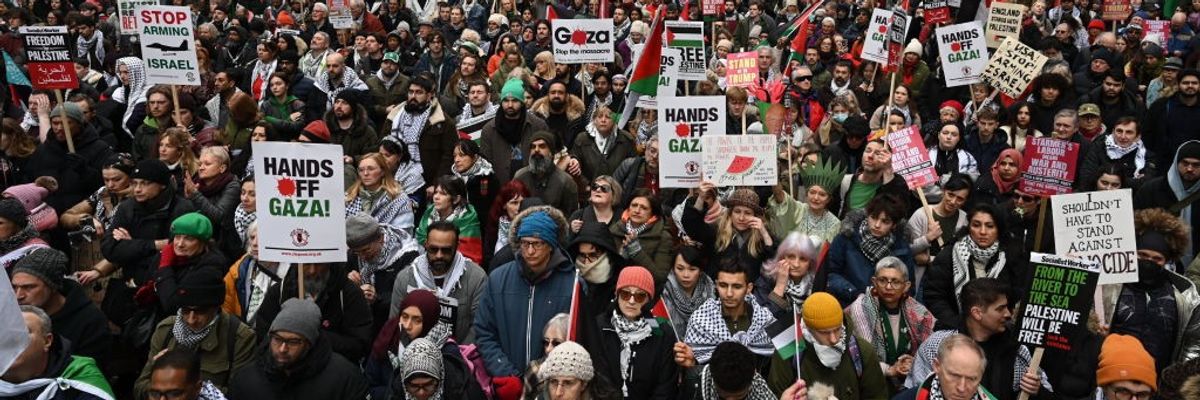Thousands of people marched to the United States Embassy in London on Saturday to protest President Donald Trump's ethnic cleansing plan for the Gaza Strip, a proposal that has been roundly condemned as unlawful and monstrous by the U.N., international human rights organizations, and Palestinians living in the enclave decimated by relentless Israeli bombing.
The march came after Trump doubled down on his proposal for the U.S. to "take over" Gaza after forcibly and permanently displacing Palestinians from the territory.
"Think of it as a big real estate site, and the United States is going to own it and we'll slowly—very slowly, we're in no rush—develop it," Trump told reporters last weekend.
Marchers carried signs Sunday expressing contempt for the president's proposal, which Amnesty International denounced as "inflammatory, outrageous, and shameful."
 Protesters march to the U.S. Embassy in London on February 15, 2025. (Photo: Wiktor Szymanowicz/Future Publishing via Getty Images)
Protesters march to the U.S. Embassy in London on February 15, 2025. (Photo: Wiktor Szymanowicz/Future Publishing via Getty Images)
Stephen Kapos, an 87-year-old Holocaust survivor, toldAFP on Saturday that Trump's proposal is "completely immoral and illegal, and also impractical and absurd."
"It's not going to happen," Kapos added, "but it does a lot of damage simply stating that as an endgame."
The mass demonstration in London, organized by the Palestine Solidarity Campaign and other organizations, followed news that Hamas freed three additional Israeli hostages on Saturday in exchange for the release of more than 360 Palestinians who were held in Israeli prisons.
The exchange was part of a tenuous cease-fire deal reached in January after 15 months of incessant U.S.-backed Israeli attacks on the Gaza Strip.
The assault's impact on Palestinians in Gaza was, and continues to be, catastrophic. According to an article published in The Lancet earlier this month, Israel's war on the Gaza Strip "generated a life expectancy loss of more than 30 years during the first 12 months of the war, nearly halving prewar levels."
"Actual losses are likely to be higher," the researchers noted, stressing that their estimate was conservative and "did not account for the indirect effect of the war."


 Protesters march to the U.S. Embassy in London on February 15, 2025. (Photo: Wiktor Szymanowicz/Future Publishing via Getty Images)
Protesters march to the U.S. Embassy in London on February 15, 2025. (Photo: Wiktor Szymanowicz/Future Publishing via Getty Images)